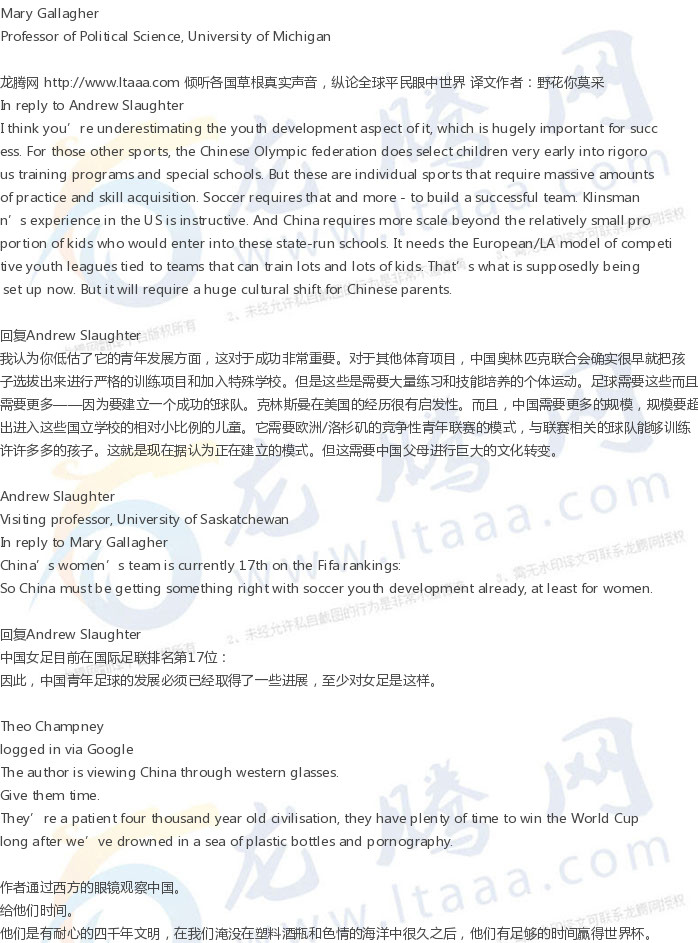中国可能成为足球强国吗? [美国媒体]
到目前为止,中国只在2002年获得了一次参加世界杯这个全球足球赛的资格,而且在世界杯上从未进过球。
To date, China has qualified for this global soccer tournament just once, in 2002, and it has never scored a goal in the World Cup.
到目前为止,中国只在2002年获得了一次参加世界杯这个全球足球赛的资格,而且在世界杯上从未进过球。
Can China go from soccer dud to soccer superpower? My guess is probably not – at least not in Xi’s lifetime.
中国能从足球弱国变成足球超级大国吗?我猜大概不能。
Not a winner
不是赢家
Xi can also ensure that his countrymen see and play more soccer. China’s 2016 plan for Chinese soccer greatness proposes to build 70,000 new stadiums and develop 20,000 new specialized schools, with the aim of having 30 to 50 million Chinese children playing soccer by 2020.
2016年的“中国足球伟大计划”提出,到2020年,中国将建成70000个新体育场,发展20000所新的专门学校,目标是让3000万至5000万中国儿童踢足球。
China’s ferocious academic culture
中国残酷的学术文化
So Chinese soccer may well improve dramatically over the next two decades. But I believe China lacks the culture and institutions to achieve Xi’s third goal: winning the World Cup.
因此,中国足球在未来二十年可能会有很大的改善。但我相信中国缺乏文化和制度来实现赢得世界杯的目标。
For one, history shows that investment from China’s soccer plan will inevitably be directed mostly to coastal megacities and capitals because of the country’s administrative hierarchy. That hierarchy systematically benefits provincial capitals and large municipalities. My experience is that the trickle-down to rural areas, where about half of the population still lives, is slow and minimal.
一方面,历史表明,由于中国的行政等级制度,中国足球计划的投资将不可避免地主要流向沿海大城市和省会城市。这种等级制度系统地使省会和大城市受益。我的经验是,流入农村地区的速度很慢,而且很少,那里仍有大约一半的人口居住。
I see no evidence that China is currently training the next generation of global soccer stars.
我没有看到任何证据表明中国正在培养下一代的全球足球明星。
Not enough space
空间不够
Even China’s economic boom does not work entirely in soccer’s favor.
The bulk of China’s 1.38 billion people live in central and eastern China, where cities are among the most densely populated in the world. Urban real estate prices there are sky high, so recreational space in cities – like soccer fields that can be used for pickup games and local leagues – are few and far between.
即使中国经济的繁荣也不能说是完全有利于足球。
中国13.8亿人口中大部分生活在中国中部和东部,那里的城市有着世界上最高的人口密度。城市地产价格高得惊人,所以城市里的娱乐空间——比如足球场,可以用来临时比赛和用于当地联赛——非常少而且也很远。
Japan has 200 sports fields for every 10,000 people. China has seven, and most of them are owned by schools or the military. Your average American has access to 19 times more sports space than the average China resident.
日本每10000人有200个运动场。中国只有七个,而且其中大多数是学校或军队所有。美国人平均比中国居民多19倍的运动空间。
China is massive – bigger than Germany, Brazil and South Africa combined. But that doesn’t mean there is a lot of free space. Land in rural China is still dominated by small-scale agriculture.
中国幅员辽阔,比德国、巴西和南非的总和还要大。但这并不意味着有很多自由空间。中国农村的土地仍然以小规模农业为主。
Basketball courts are far more common in China, which may explain why more Chinese people play basketball. Some 33 million Chinese follow the NBA’s account on Weibo, China’s answer to Twitter.
篮球场在中国非常普遍,这也许可以解释为什么更多的中国人打篮球。大约有3300万中国人在微博上关注NBA的账号。
Culture gap
文化差距
The central government’s 2016 soccer plan addresses China’s deficit in youth talent development and infrastructure by proposing more childhood soccer training and building more soccer stadiums.
中央政府2016年的足球计划为了解决中国足球青年人才发展和基础设施的缺陷,提出更多的儿童足球训练和建设更多的足球场。
The culture gap may prove harder to overcome, though. China just isn’t a soccer country. I rarely saw kids playing informal games in the streets of China with a soda can or a half-deflated ball as one does across Latin America and Africa.
然而,文化差异可能更难克服。中国不是一个足球国家。我很少看到孩子们像拉美和非洲人一样在中国的街道上拿着汽水罐或半充气的球玩非正式的足球游戏。
That’s because many traditional soccer powers have marginalized women’s participation in the sport. If Xi wants China to make its mark as a soccer upstart, the women’s team may be his best investment.
这是因为许多传统的足球强国已经将妇女参与该项体育运动边缘化了。如果中国想成为一名足球新贵,那么女队也许是最好的投资。
Author
Mary Gallagher
Professor of Political Science, University of Michigan
作者
Mary Gallagher
密歇根大学政治学教授
Andrew Slaughter
Visiting professor, University of Saskatchewan
I don’t know much about soccer but I suspect the author does not know much either. My question is, why have the same barriers the author mentioned not stopped China from becoming globally-dominant in a whole lot of other sports such as gymnastics, diving, shooting and weightlifting? They all require major dedication and infrastructure. I don’t think a culture gap is that much of a problem for the Chinese - after all, you can’t argue that sports like snooker have been traditionally strong in China, yet this is another sport at which they are dominant. I think the author is underestimating the determination of China.
我对足球了解不多,但我怀疑作者也不太了解。我的问题是,为什么作者提到的这些相同的障碍并没有阻止中国在许多其他运动中成为全球主导,比如体操、跳水、射击和举重?它们都需要大量的奉献和基础设施。我认为文化差异对中国人来说不是那么大的问题——毕竟,你不能说像斯诺克这样的运动中国传统上很强大,但这是另一项他们占统治地位的运动。我认为作者低估了中国的决心。
Howard Huxter
I’m somewhat surprised by this article coming from the other side of the pond (as we say in the UK). There are some apt points but the crucial ingredient is missing and one which not even the Chinese government seems to understand.
这篇来自池塘另一边的文章让我有点吃惊。有些观点很贴切,但缺少关键因素,甚至中国政府似乎也不明白的关键因素。
When I have raised the topic with my university students over the past 16 years, I have usually been met with laughter.
在过去的16年里,当我向我的大学生们提出这个话题时,他们经常会笑出声来。
Ask yourselves why English football is so successful - not in the ‘winning’ sense but money-wise, international acclaim, news-worthiness, etc.
问问自己为什么英国足球如此成功——不是在“赢”的意义上,而是在理财、国际声誉、新闻价值等方面。
The answer is supporters. English clubs and England have superb support as do European clubs too, but clubs and England take the biscuit. Of course the clubs buy talent, but this alone is useless without the supporter base. This is what China fails to understand.
答案是支持者。英国俱乐部和英格兰同欧洲俱乐部一样得到了极好的支持,但是俱乐部和英格兰极其可恶。当然,俱乐部会买人才,但是没有球迷基础,单凭这一点是毫无用处的。这是中国无法理解的。
Yizhi Cao
I’m a Female soccer player(Amateur) from Tianjin, China. From what I can see, there are many people, men, women and children playing soccer during the weekends. Actually, China has strong traditions play soccer, especially in the North part of China. What you found is true, there are only less than 4 million male players who are registered, not even mention female players.
我是来自中国天津的女足球运动员(业余)。从我所看到的,有很多人,男人,女人和孩子在周末踢足球。事实上,中国有很强的踢足球的传统,特别是在中国北部。你所发现的是真的,只有不到400万男性注册球员,更不用说女性球员了。
Apart from what you said, in China, soccer is not only a sport but related to many elements. For one, except those who can play in the professional team with great pay, others does not paid with the corresponding salary, a female soccer player only earned 3k RMB per month on average. Playing soccer is seeing by many parents as a futureless job. Secondly, the hierarchy is cheating themselves while other countries are focusing on youth soccer. It’s hilarious that the officials who are supervising and in charge of this sports not even athletes. It’s not melodramatic that soccer sports in China in some extends is a political mission, not simply driven by personal interests.
除了你说的,在中国足球不仅是一项体育运动,而且与许多因素有关。一方面,除了高薪在职业球队踢球的球员,其他人没有获得相应的薪水,一个女足球运动员平均每月只赚3千人民币。踢足球被许多父母看作是一份没有前途的工作。第二,当其他国家把注意力集中在青年足球时,而中国的等级制度却正在欺骗他们自己。真搞笑,那些监督和负责这项运动的官员甚至不是运动员。中国足球运动在某种程度上是一项政治任务,而不仅仅是个人兴趣的驱动,这并不是夸张。
版权声明
我们致力于传递世界各地老百姓最真实、最直接、最详尽的对中国的看法
【版权与免责声明】如发现内容存在版权问题,烦请提供相关信息发邮件,
我们将及时沟通与处理。本站内容除非来源注明五毛网,否则均为网友转载,涉及言论、版权与本站无关。
本文仅代表作者观点,不代表本站立场。
本文来自网络,如有侵权及时联系本网站。
图文文章RECOMMEND
热门文章HOT NEWS
-
1
Why do most people who have a positive view of China have been to ...
- 2
- 3
- 4
- 5
- 6
- 7
- 8
- 9
- 10
推荐文章HOT NEWS
-
1
Why do most people who have a positive view of China have been to ...
- 2
- 3
- 4
- 5
- 6
- 7
- 8
- 9
- 10
















